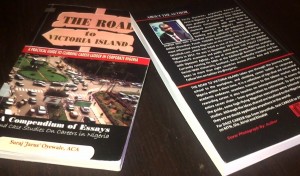
Founder of JarusHub, Jarus, was recently interviewed by BusinessDay, Nigeria’s most respected business daily. He discussed his book, The Road to Victoria Island, employability of Nigerian graduates and other matters in the interview published in the Sunday, 27 September 2015 edition of the newspaper.
PDF version of the newspaper cut can be downloaded here: JARUS INTERVIEW WITH BUSINESSDAY
The interview is also presented below:
1. How would you sum up the central message of The Road to Victoria Island?
The key message the book seeks to pass is that hardwork and integrity still remain key virtues to career rise in Nigeria. The Road to Victoria Island just means the path to successful 9-5 career in Nigeria. I used Victoria Island as a metaphor for 9-5 job in Nigeria, because VI qualifies to be the Corporate Capital of Nigeria. It is an unwritten rule that a company, especially in financial services sector, has not “arrived” until it has an office in VI. This is similar to the use of Wall Street in Corporate America. Wall Street is the Investment Banking capital of America, and probably World. A secondary intention behind the book is to champion the use of VI as the Corporate Capital of Nigeria. I hope this will stay and financial journalists and analysts will join me in adopting this coinage.
2. What inspired you to write the book, and what did you set out to achieve?
I have been fortunate to have good people around me all my life. I have benefitted from information. I remember when I gained admission into Obafemi Awolowo University, Ile-Ife, in 2001, my brother, Akeem (now a GM in a top bank in Nigeria), called me and said “Suraj, try and make a first class. If you make a first class in economics, it will open doors for you”. I also have another friend, Michael Taiwo (now with Shell US), who had gained admission into university one year earlier than I did, and gave me all information on everything I needed to do well in Ife. When I was about finishing in Ife, I also got to meet a couple of mentors, like Mr. Niyi Yusuf (now CEO of Accenture Nigeria) and I benefitted a lot from career information I got from them.
I realised that a lot of young Nigerians don’t have this privilege. From my interactions with many Nigerian students and graduates, I saw that there’s an information gap. There are otherwise brilliant students and graduates that just don’t have right information and as such couldn’t get good jobs or any jobs at all. This inspired me to write this book. Actually, I had written and published most of the content of the book in different forums, including in BusinessDay, in the past, I just compiled them into this book.
The book seeks to bridge career information gap. It seeks to enlighten students and graduates on things they need to do at different stages (school, NYSC, job hunt period, workplace, etc) with a view to having successful career.
3. In this age of ‘entrepreneurism’, when many believe self-employment is the absolute solution to the seemingly intractable unemployment problem, why did you choose to write a book that seems to celebrate white-collar career path?
Yes, I celebrate white-collar job because that’s my comfort zone, at least for now. I also see it as playing the devil’s advocate. It is fashionable for people that talk about entrepreneurship to demonize 9-5 employment. Someone needs to speak for the “devil” that is salaried job too.
Entrepreneurship is good, but I believe not everyone is cut out for it. I always argue that if you do your job diligently as a white-collar person and rise to the peak of your career, you can lead a decent life post-retirement. So people should not bully us to say we’re slaves for opting for the path of white-collar jobs for now. Someone has to speak for white-collar job too. That’s why I celebrate white-collar job in the book. By the way, I also touched briefly on entrepreneurship.
4. Unemployability of Nigerian graduates is one issue that often crops up in employment circles. Do you think this is real, and if so, to what extent do you expect The Road to Victoria Island to provide a solution?
I agree that unemployability is a bigger challenge in Nigeria than lack of jobs. But this is a systemic issue. It starts from school. An educational system that focuses on just cramming to pass cannot produce employable graduates. A system that doesn’t allow innovation wont produce quality graduates. In many Nigerian schools, if a student changes the exact English words used in defining a term, he has failed. It doesn’t matter if he’s passing the same message as the definition given in class. Such a system kills creativity and students carry this kind of thing (one-way, narrow knowledge) to the workplace.
The Road to VI teaches skills that students need to imbibe in school beyond what they learn in class. Things like communication skills, networking, managing people, being versatile, knowing beyond their course of study, and so on. I believe these skills improve employability.
5. How has the book been received since its release? Any feedbacks?
The feedback has been encouraging. I receive emails and phone calls from people to commend me on the content. But we still have a challenge with distribution. Many people find it to discern what the book is about from mere reading of the content. I once got a feedback from one of the distributors that someone once asked me that “I’m coming from Victoria Island. I know the way to Victoria Island”. This is both funny and tragic. Why it is funny is apparent, but why it is tragic is the fact it underscores the tendency of Nigerians to read things only literally. When you go figurative or begin to be creative with words in Nigeria, many people are lost. The book is not an atlas. The “Road” used there is just figurative.
6. On a personal note, what word do you have for would-be users of the book?Let me reiterate that I’m not an expert on career matters, at least, yet. I had only 7 years work experience at the time I published the book (2014). But I don’t think that should stop me from sharing my experience and experience of friends and even people I observed from afar, with a view to guiding younger ones in their careers. If I see a problem (information gap) and don’t take action, posterity will judge me. As a matter of fact, I drew more from the careers of successful executives in Nigerian. I also talked to a couple of senior professionals who shared their career experience. I have also studied the career trajectories of some top guys in Corporate Nigeria. All these I deployed in writing the book.I believe any would-be reader will find the book helpful in understanding the nuances of careers in Corporate Nigeria.
***
To grab your copy of the book, click here:
Established in March 2013, JarusHub is a Nigerian information hub with focus on career and management. It is rated Nigeria's most authoritative destination for online career resources. It parades an array of Nigerian professionals who share their career experiences with a view to bridging career information gap and mentoring a generation to success. JarusHub has revolutionised career information and experience sharing in Africa. Whether you're a student, a recent graduate or an established professional, or even an executive, you will always find something to learn on JarusHub. All enquiries to jarushub@gmail.com or 0808 540 4500. Facebook: www.facebook.com/jarushub; Twitter: @jarushub or @mcjarus.
Making the most of your 9-5: An Interview with Jarus
June 27, 2021
Let us have your say by leaving a comment belowCancel reply
Recommended For You
-
TOP 20 US COMPANIES WITH BENEFITS & PERKS – 2016
February 5, 2016 -
FEMI TAIWO @ 30: Lessons in Selflessness (i)
July 26, 2013






